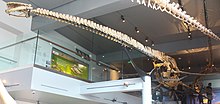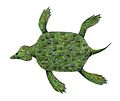Morenosaurus

| Morenosaurus Temporal range: Late Cretaceous, | |
|---|---|
 | |
| Mounted skeleton (CIT 2802), Natural History Museum of Los Angeles County | |
 | |
| Life reconstruction of M. stocki | |
| Scientific classification | |
| Kingdom: | |
| Phylum: | |
| Class: | |
| Superorder: | |
| Order: | |
| Family: | |
| Genus: | Morenosaurus |
| Species | |

Morenosaurus is an extinct genus of plesiosaur from the Cretaceous of what is now California. The type species is Morenosaurus stocki, first named by Samuel Welles in 1943, in honor of Dr. Chester Stock.[1] The species was found by Robert Wallace and Arthur Drescher in the Panoche Hills region of Fresno County. The skeleton they found was fairly complete, and lacked only the head and parts of the neck and paddles; the preserved portion of the trunk and tail is 3.63 metres (11.9 ft) long.[2] The skeleton was originally mounted at Caltech but is now in the Natural History Museum of Los Angeles County.
Morenosaurus may have been similar to Elasmosaurus or Thalassomedon, but studies in the early 2000s indicated that the fossils were too scrappy to identify to the family level.[citation needed]
See also
[edit]References
[edit]- ^ Hilton, Richard P., Dinosaurs and Other Mesozoic Animals of California, University of California Press, Berkeley 2003 ISBN 0-520-23315-8, at page 105
- ^ O'Gorman, J.P. (2016). "A Small Body Sized Non-Aristonectine Elasmosaurid (Sauropterygia, Plesiosauria) from the Late Cretaceous of Patagonia with Comments on the Relationships of the Patagonian and Antarctic Elasmosaurids" (PDF). Ameghiniana. 53 (3): 245–268. doi:10.5710/AMGH.29.11.2015.2928. S2CID 133139689.
- Sepkoski, J.J. (2002). A compendium of fossil marine animal genera. Bulletins of American Paleontology 363: 1-560.
- Drunkenmiller, Patrick S. and Russell, Anthony P. (2006). A new elasmosaurid plesiosaur (Reptilia: Sauropterygia) from the Lower Cretaceous Clearwater Formation, northeastern Alberta, Canada. Paludicola 5 (4): 184-199.
External links
[edit]- Morenosaurus from the PaleoBiology Database
- Morenosaurus at the Natural History Museum






